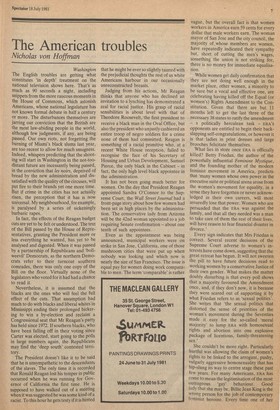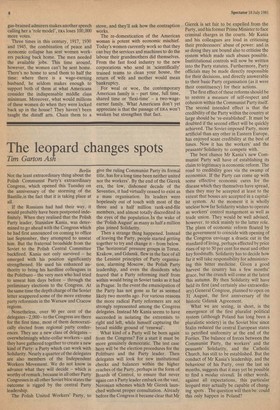The American troubles
Nicholas von Hoffman
Washington The English troubles are getting what constitutes 'in depth' treatment on the national television shows here. That's as much as 90 seconds a night, including snippets from the more raucous moments in the House of Commons, which astonish Americans, whose national legislature has not known formal debate in half a century or more. The disturbances themselves are Jarring our conviction that the British are the most law-abiding people in the world, although few judgments, if any, are being passed. Our own riots, not forgetting the burning of Miami's black slums last year, are too recent to allow for much smugness. Indeed, whispers predicting that the shooting will start in Washington in the not-toodistant future are incessantly being passed, in the conviction that les noirs, deprived of bread by the new administration and dissatisfied with the quality of the circuses, will put fire to their brands yet one more time. But if crime in the cities has not actually risen, the perception that it has is now universal. My neighbourhood, for example, is paralysed by a series of sickeningly barbaric rapes.
In fact, the effects of the Reagan budget cuts are yet to be felt or understood. The text of the Bill passed by the House of Representatives, granting the President more or less everything he wanted, has yet to be analysed and digested. When it was passed by a partnership of Republicans and 'bollweevil' Democrats, as the northern Democrats refer to their turncoat southern comrades, there was only one copy of the Bill on the floor. Virtually none of the legislators who voted for it had had a chance to read it.
Nevertheless, it is assumed that the blacks are the ones who will feel the full effect of the cuts. That assumption had much to do with blacks and liberal whites in Mississippi ending their prolonged bickering to win a by-election and reclaim a Congressional seat that Mr Reagan's party has held since 1972. If southern blacks, who have been falling off in their voting since Carter was elected, start going to the polls in large numbers again, the Republicans may find the 'deep south' contested territory. The President doesn't like it to be said that he is unsympathetic to the descendants of the slaves. The only time it is recorded that Ronald Reagan lost his temper in public occurred when he was running for Governor of California the first time. He is supposed to have walked out of a meeting when it was suggested he was some kind of a racist. To this hour he gets testy if it is hinted that he might be ever so slightly tainted with the prejudicial thoughts the rest of us white Americans harbour in our occasionally unreconstructed breasts.
Judging from his actions, Mr Reagan thinks that anyone who has declined an invitation to a lynching has demonstrated a zeal for racial justice. His grasp of racial sensibilities is about level with that of Theodore Roosevelt, the first president to receive a black man in the Oval Office, but also the president who unjustly cashiered an entire troop of negro soldiers for a crime none of them had committed. Reagan is something of a racial primitive who, at a recent White House reception, failed to recognise the face of his Secretary of Housing and Urban Development, Samuel Pierce, the only black in the Cabinet — in fact, the only high level black appointee in the administration.
It has not been going much better for women. On the day that President Reagan appointed Sandra O'Connor to the Supreme Court, the Wall Street Journal had a front-page story about how few women had been set in high places by the administration. The conservative lady from Arizona will be the 42nd woman appointed to a job requiring Senate confirmation — about one tenth of such appointees.
Even as the appointment was being announced, municipal workers were on strike in San Jose, California, one of those mushroom cities that were put up when nobody was looking and which now is nearly the size of San Francisco. The issue is equal pay for women doing work comparable to men. The term 'comparable' is rather vague, but the overall fact is that women workers in America earn 59 cents for every dollar that male workers earn. The woman mayor of San Jose and the city council, the majority of, whose members are women, have repeatedly indicated their sympathy but, short of cutting the men's wages, something the union is not striking for, there is no money for immediate equalisation.
While women get daily confirmation that they are not doing well enough in the market place, other women, a minority to be sure but a vocal and effective one, are celebrating having killed off the Equal (or women's) Rights Amendment to the Constitution. Given that there are but 11 months left to get the last three of the necessary 38 states to ratify the amendment — a politically herculean task — ERA'S opponents are entitled to begin their backslapping self-congratulations, or however it is that ladies in print dresses and large brooches felicitate themselves.
What lies in store once ERA is officially killed? Betty Friedan, the author of the powerfully influential Feminine Mystique, and the founding mother of the modern feminist movement in America, predicts that 'many women whose own power in the executive suite or political arena arose from the women's movement for equality, in a sense they have forgotten or never acknowledged in their own careers, will most assuredly lose that power. Women who are persuaded that the ERA was against the family, and that all they needed was a man to take care of them the rest of their lives, will have reason to fear financial disaster in divorce.'
Every sign indicates that Mrs Friedan is correct. Several recent decisions of the Supreme Court adverse to women's interests have come down, suggesting that the great retreat has begun. It will not sweeten the pill to have future decisions read to working women by a conservative Justice of their own gender. What makes the matter doubly disturbing is that every poll shows that a majority favoured the Amendment once, and, if they don't now, it is because they were scared out of supporting it by what Friedan refers to as 'sexual politics'. She writes that 'the sexual politics that distorted the sense of priorities of the woman's movement during the Seventies made it easy for the so-called 'moral majority' to lump ERA with homosexual rights and abortion into one explosive package of licentious, family-threatening sex.'
She couldn't be more right. Particularly hurtful was allowing the claim of women's rights to be linked to the arrogant, pushy, vulgarly aggressive homosexuality that has hip-slung its way to centre stage these past few years. For many Americans, ERA has come to mean the legitimisation of the most outrageous 'gay' behaviour. Good lady that she may be, Billie Jean King is the wrong person for the job of contemporary feminist heroine. Every time one of her gas-brained admirers makes another speech calling her a 'role model', ERA loses 100,000 more votes.
Three times in this century, 1917, 1930 and 1945, the combination of peace and economic collapse has sent women workers packing back home. The men needed the available jobs. This time around, however, the women can't be sent home. There's no home to send them to half the time: where there is a wage-earning husband, he seldom makes enough to support both of them at what Americans consider the indispensable middle class minimum. Moreover, what would millions of these women do when they were locked back up in the house? They haven't been taught the distaff arts. Chain them to a stove, and they'll ask how the contraption works.
The re-domestication of the American woman is potent with economic mischief. Today's women currently work so that they can buy the services and machines to do the labour their grandmothers did themselves. From the fast food industry to the new corporations who send in 'scientifically' trained teams to clean your house, the return of wife and mother would mean bankruptcy.
For weal or woe, the contemporary American family is — part time, full time, shared time or 'flexi-time' — a two-wageearner family. What Americans don't yet appreciate is that the passage of ERA won't weaken but strengthen that fact.



































 Previous page
Previous page